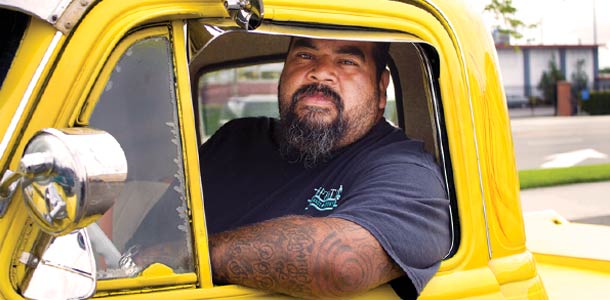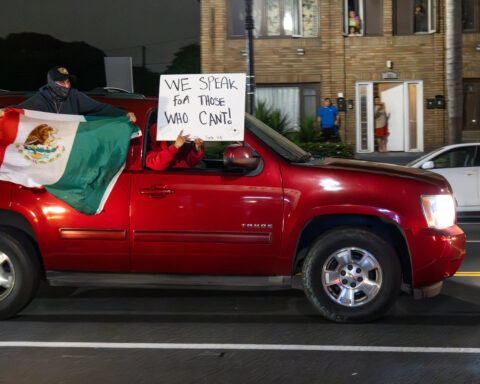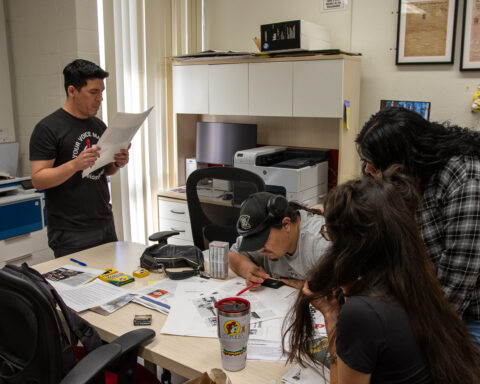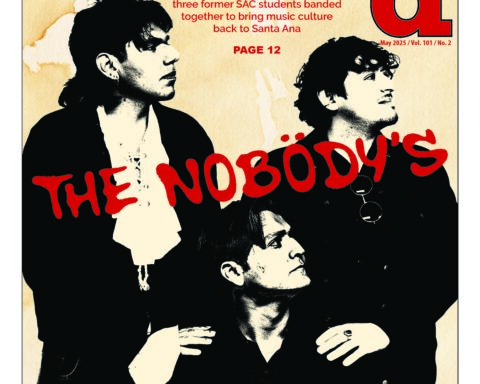
By C. Harold Pierce
A heavy police presence and disinterested youth leaves Santa Ana lowrider culture adrift.
It’s the Saturday after Easter at about 9 a.m and there isn’t a cop in sight. Victor Mendez turns on the ignition of his deep blue 1966 Chevrolet Impala named “The Omen.” It rumbles and quakes.
The interior reveals ominous tidings: The Omen isn’t equipped with seatbelts. Or airbags.
“Let’s put on some real lowrider music,” he says as he punches the stereo and hits the hydraulic switches that make the car go bump.
The bass booms and the Impala jolts to life as Mendez cruises south on Bristol, the same Santa Ana street that gave birth to Orange County’s lowrider culture. Thousands of lowriders flocked here for more than 30 years before law enforcement started squeezing them out.
Mendez cruises through a forbidden stretch of road he traveled as a lowrider with his wife and high school sweetheart, Elsa, the same street where they hoped to pass on this local tradition to their children.
When Victor hits several switches and drops the rear bumper, it scrapes the asphalt, drowning out the music playing in the car while lighting up the street with sparks.
“This grabs a lot of attention,” he says just before pulling a U-turn, whipping around and hitting the three-wheel motion on Edinger. The Omen is built like a boat, so without power steering, he has to turn the wheel 4 times, barely missing a light pole.
Thousands of Southern California lowriders flock to Bristol Street every Easter, parading their souped up, tricked out, detailed lowriders and pick-up trucks. Easter cruising was Santa Ana’s twisted spin on traditional Easter parades with balloon floats replaced by shiny chrome, loud exhausts and hopping hydraulics.
Yet Santa Ana police are determined to stem a decades-old custom. This Easter, they scattered orange cones and set up road blocks on major streets and minor nooks leading up to Bristol’s center stage, handing out tickets at the slightest swoosh, the tell-tale sound of a hydraulic system.
The number of Easter cruisers has declined the past three years. Heightened police presence and the possibility of expensive fines for code violations ranging from unsafe suspension tickets to illegal tint has many cruisers garaging their cars, except for car shows or special occasions.
“For a lowrider, everything on your car is illegal,” said Adan Olivares, sales manager at Bristol Sound, a local electronics warehouse that services lowriders. “Getting pulled over is going to cost $1000, and on Easter night, you’re going to get a ticket. Just by your front wheels hitting the public streets, you broke the law because that car is modified.”
Olivares adds, “But that’s part of the game,” hinting at his and other riders’ determination at keeping the 30-year old tradition alive.
Easter enforcement increased about four years ago, according to Santa Ana Police Information Officer Anthony Bertagna, who said that fewer arrests have been made and violence and criminal behavior on Easter night has declined ever since.
“I’m an O.C. lowrider, and I spent my whole day in L.A. because there’s nothing here,” Olivares said, adding that the ramped up enforcement has shut down a local tradition that was larger than Lowrider Magazine’s super show in Las Vegas.
“We don’t tell people that they can’t come, but if you’re going to come to our city, you’re going to behave and follow the laws,” said Bertagna, pointing out that the biggest problem with cruising in the past was the interaction between drivers and pedestrians.
“There would be girls hanging out of cars and boys being juvenile trying to communicate with them, and that takes away from what you’re supposed to be doing which is driving,” Bertagna said.
The chilling effect of the police presence seems to be working.
“We’re afraid to be out on the streets. A lot of people think, ‘why take my car out if they’re going to harass me?’” said Elsa Mendez as she sat in her baby pink 1966 Chevrolet Caprice named Sweeter than Candy.
Car club leaders say the community’s perception of lowriders as gang members gives them a bad reputation.
“We’re misunderstood. I’m not going to say gangsters don’t gravitate to this. Of course they do. It’s their dream to have a car like this, but that’s what we have police for,” Olivares said.
While many of the car club members are ex-gangsters, they see it as a stepping stone to a better life, Olivares said.
“Instead of getting into gangs, they get into low riders, and that’s what my boys did. That’s where our club is at. We have members from different gangs, but they left their gangs behind to join the car club,” Joe Perez, a founding father for Classics O.C. car club said.
While lowrider tradition has been passed on for generations, many younger enthusiasts are now leaning towards single-cab trucks with dubs, or 20-inch rims, rather than the sedan classics of their parent’s generation.
Joe Perez remembers the days when he would cruise Main Street as a teenager in his 1964 Chevrolet Impala.
“It was bumper to bumper from McFadden to 1st Street, so I decided to go on the opposite side. I picked up the back and dropped the front and just lit up the whole street with all the sparks,” Perez said.
The cops cut him loose with a warning and told him they didn’t want to see him on Main Street again. Five minutes later he was cruising Bristol.
“When you’re a kid, you do a lot of dumb things,” Perez said.
Joe’s blue 1964 Impala, “Ice Cube” is an all around family car. His grandkid’s names, “Bella” and “Tori” are emblazoned on his dashboard, and his sons often take the car cruising.
“They need to have their fun, too. I had fun in my day, now it’s their turn,” Joe said.
Ronnie Trejo, the president of Temptation Car Club in O.C. drives his father’s 1951 Chevrolet Pickup that they modified together before he passed away.
“It goes from parents to their kids,” said Trejo, whose daughters are already planning for cars of their own. “You have to be born into this.”
“It’s not the cars, but the lifestyle. It’s a community thing, and when you get back to school, it’s cool to tell your friends what you did over the weekend,” Ronnie’s daughter, Priscilla Trejo said.
When it comes to Victor and Elsa’s kids, Victor says their 14-year old daughter already has her eye on her father’s blue 1966 Impala, and not the baby pink Caprice.
“She actually says both of them are hers,” Elsa interjected, adding that her daughter is more enthusiastic about cruising than her sons. “She’ll go to the shows half asleep, even if she has to wake up early and be grumpy.”
Still, lowrider culture is shrinking, Olivares says, and Easter 2009 was the last time Bristol Street had a large turnout of cruisers.
The consensus among the lowrider community is that the only way to keep the culture going is to keep passing the tradition down each generation.
At the lowrider meet, a teenager with headphones strapped around his neck walks by, scoping out the cars.
“How much does it cost to build?” he asks as he runs his fingers across the front quarter panel of The Omen.
Victor closes the hood and eases into the driver’s seat—his throne. “Blood, sweat and tears,” he says and then cruises off.
- April 28: Sunday Afternoon Cruising at El Rancho Restaurant 9 a.m.
- May 26: Memorial Day Car Show at Willmore Elementary from 9 a.m. to 5 p.m.
- June 2: Roosevelt Elementary Car Show from 10 a.m. to 3 p.m.
- The two-party system is failing us. - October 19, 2024
- Read our Fall 2023 Print: Vol. 100 No. 1 - October 23, 2023
- Santa Ana College Awarded State Department of Finance Grant - April 2, 2015












